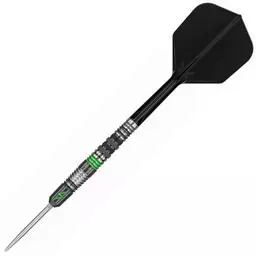Closing A Match
Let's consider one more scenario. This one actually happened to me recently. My opponent and I tied with points at 137. I needed one bull to end the game, he had bulls closed and was two 16's away from a win, and it was my throw. I had a couple of options. I could take my first shot at the bull and perhaps end the game with one dart. But what if I miss? Sure, I still have two more shots at it, but I can't afford two misses. My opponent has only to hit a couple of fat wedges on the 16, which is a lot bigger target. The other option is to take a shot at the 16. A defensive ploy in this situation is probably the better choice. Hit a 16 and I have forced my opponent to hit another bullseye should I miss with my next two darts.
I chose to throw at the 16 and I hit it. Now my shot at the bull is less critical, because even if I miss, my opponent has to come up with a much harder throw than merely dropping two darts into the fat 16. As it turned out, my next dart hit the bull and I won the game. My opponent reacted like I poked him in the eye with a sharp stick. He didn't understand why I didn't throw for the win with my first dart. He thought I was trying to rub it in, but I was merely playing smart darts. No point in whining about how your opponent plays Cricket. If you throw good darts and employ superior strategy, you will win most of the time.
The best way to deal with point mongers is to ignore them. Go about the business of closing numbers and moving toward the end of the game. You can usually make up points by closing a couple of numbers ahead. U.S. Grant advised his generals to stop worrying about what Robert E. Lee was going to do next, and start thinking about what they could do to him. Grant's strategy was sound in Virginia in 1864, and is just as sound in the Cricket game today. Formulate a strategy and play your game.
Until Next Time!
Tony
.jpg)


